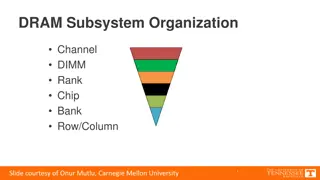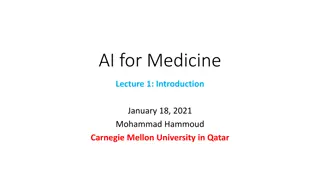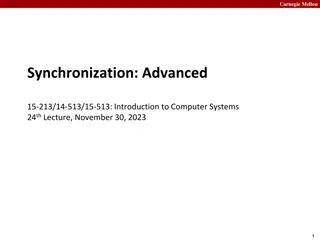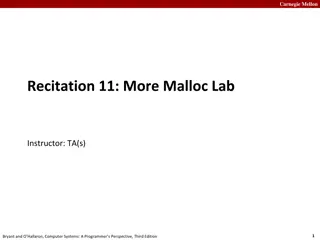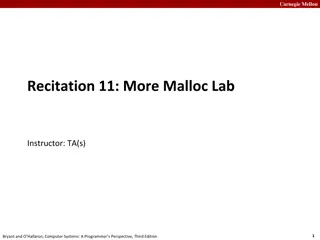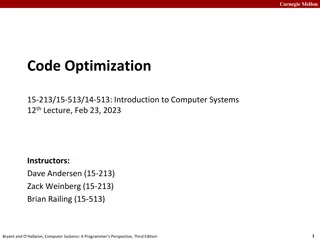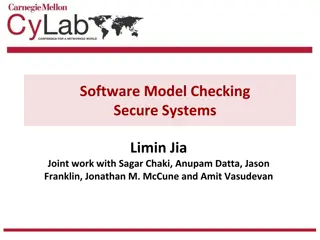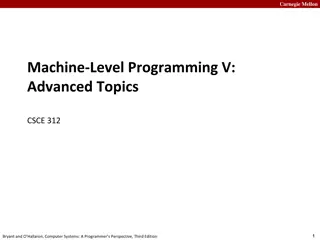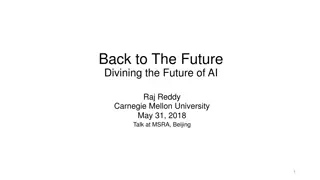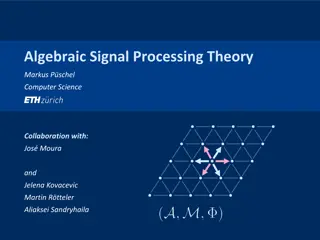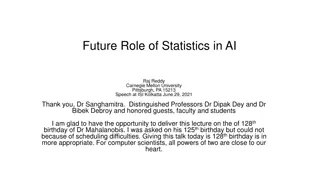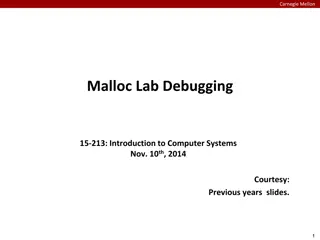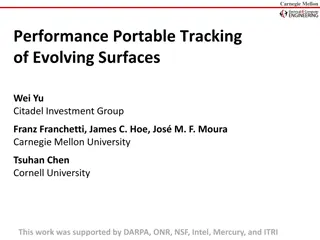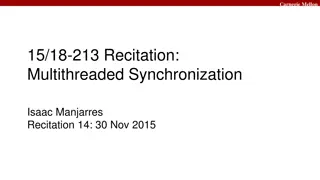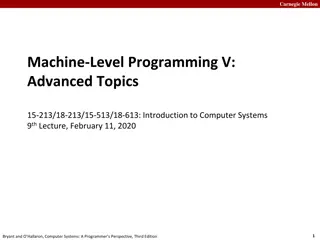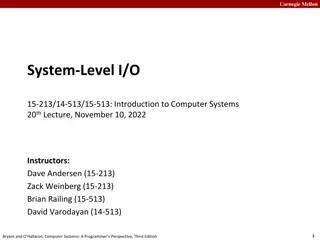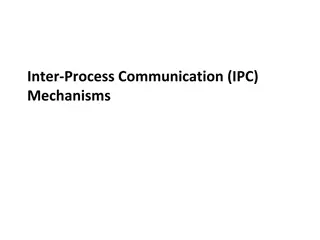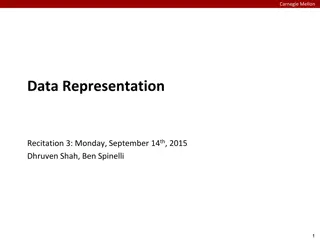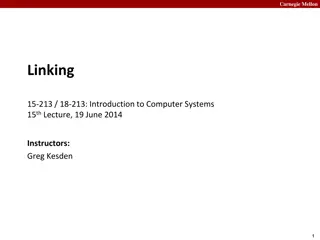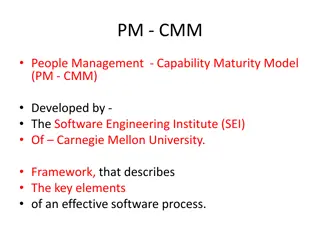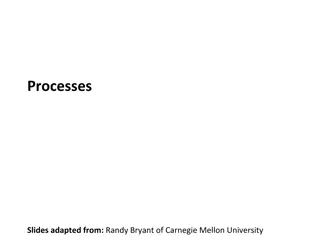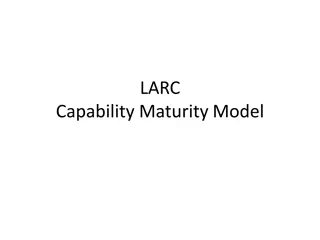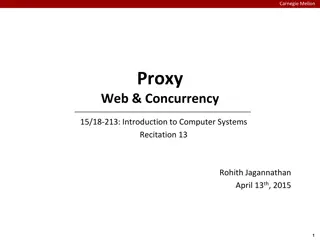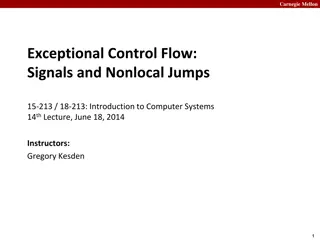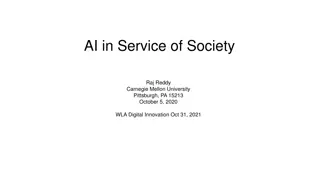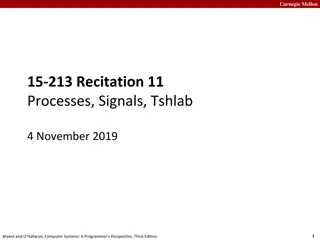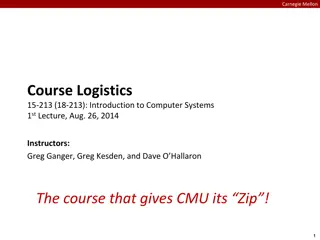Stem Cells
Role of stem cells in the body, different types of stem cells, and their potential in medicine. Developed by Carnegie Mellon students, Isabel Joyce and Cassandra Dodson.
0 views • 31 slides
Physics & Astronomy at AHC
Explore the world of Physics & Astronomy with Rob Jorstad at AHC during the STEM Week of Discovery, where you can delve into career paths, academic requirements, and important qualities for success. Discover the possibilities with a Bachelor's degree, Ph.D., and post-doc opportunities, along with in
0 views • 13 slides
Understanding the Organization of DRAM Subsystem Components
Explore the intricate structure of the DRAM subsystem, including memory channels, DIMMs, ranks, chips, banks, and rows/columns. Delve into the breakdown of DIMMs, ranks, chips, and banks to comprehend the design and functioning of DRAM memory systems. Gain insights into address decoding, row/column
0 views • 16 slides
An Overview of AI Applications in Medicine - Lecture Highlights
Introduction to AI for Medicine Lecture 1 at Carnegie Mellon University in Qatar, presented by Mohammad Hammoud. The lecture covers the impact of AI on various sectors like work, economy, medicine, and mobility. It delves into the definition of AI, showcasing examples of AI processes in computer vis
0 views • 30 slides
Carnegie Mellon Synchronization and Computer Systems Lecture Updates
Carnegie Mellon's recent announcements include lab checkpoints and finals deadlines, as well as the release of an optional lab extension for the Shark File System. The lecture topics cover races, mutual exclusion, deadlock, semaphores, events, queues, reader-writer locks, starvation, and thread-safe
0 views • 43 slides
Analysing Equity Market Exchange Structure for Anti-Competitive Practices
The discussion by Chester Spatt from Tepper School, Carnegie Mellon, delves into the intricacies of equity market exchange structures and their potential anti-competitive nature. Various topics such as post-NMS trading, exchange access fees, market data debates, and the agency problem arising from p
0 views • 30 slides
Understanding Memory Management in Computer Systems
Explore Carnegie Mellon University's concepts on heap management and memory allocation strategies as detailed in "Computer Systems: A Programmer's Perspective." Dive into topics such as extending the heap, free blocks, and common problems with throughput and memory utilization.
0 views • 21 slides
Understanding Memory Management Concepts at Carnegie Mellon University
Explore advanced topics in memory management as taught at Carnegie Mellon University, including dynamic memory allocation, heap structure visualization, and common programming challenges related to memory utilization and throughput. The content covers practical insights and solutions for optimizing
0 views • 21 slides
Understanding Buffer Overflow Attacks at Carnegie Mellon
Learn about the Carnegie Mellon 15-213 Recitation Attack Lab, where you can hijack programs using buffer overflow attacks. Gain insights into stack discipline, stack frames, and defeating secure programs through return-oriented programming. Dive into topics like stack smashing attacks, buffer overfl
8 views • 24 slides
Evolution of Compiler Optimization Techniques at Carnegie Mellon
Explore the rich history of compiler optimization techniques at Carnegie Mellon University, from the early days of machine code programming to the development of high-level languages like FORTRAN. Learn about key figures such as Grace Hopper, John Backus, and Fran Allen who revolutionized the field
0 views • 49 slides
Carnegie Mellon Secure Systems Verification Research
Carnegie Mellon University's research focuses on secure hypervisor systems, address space separation, and verification tasks to ensure security properties in the presence of adversaries. Challenges include scalability in model checking due to complex data structures in address translation. The aim i
3 views • 20 slides
Carnegie Mellon Computer Systems Overview
The content provides an overview of computer systems and network programming at Carnegie Mellon University. It covers topics such as client-server interactions, I/O handling, socket programming, and robust I/O practices. The lectures discuss concepts like TCP/IP communication, C Standard I/O, Unix I
0 views • 67 slides
Understanding Memory Layout in Computer Systems at Carnegie Mellon
Explore the memory layout in computer systems through the lens of Carnegie Mellon University's advanced topics in machine-level programming. Learn about buffer overflow vulnerability protection, memory allocation examples, x86-64 Linux memory layout, and addressing schemes. Dive into practical examp
2 views • 47 slides
Evolution of AI: Insights from Raj Reddy's Talk at Carnegie Mellon University
Delve into the future of AI through Raj Reddy's talk at Carnegie Mellon University, unraveling misconceptions, the essence of AI, historical context, and its progression into the 21st century. Explore themes such as human-AI symbiosis, problem-solving approaches, and the utilization of data-driven k
0 views • 34 slides
Carnegie Mellon Algebraic Signal Processing Theory Overview
Carnegie Mellon University is at the forefront of Algebraic Signal Processing Theory, focusing on linear signal processing in the discrete domain. Their research covers concepts such as z-transform, C-transform, Fourier transform, and various signal models and filters. The key concept lies in the al
2 views • 40 slides
The Future Role of Statistics in AI: Insights from Raj Reddy's Speech at Carnegie Mellon University
Raj Reddy's speech at Carnegie Mellon University delves into the evolving role of statistics in the field of AI, highlighting the shift towards statistical learning and the need for new methods to enable low-cost incremental learning and reinforcement learning. The talk explores the history of AI re
0 views • 15 slides
Debugging Tips for Carnegie Mellon's Malloc Lab
Explore essential debugging strategies for the Carnegie Mellon Malloc Lab, focusing on identifying errors, resolving segfaults, and implementing a heap checker to maintain well-formed heaps. Learn how to efficiently troubleshoot issues and improve your debugging skills in computer systems.
0 views • 19 slides
Carnegie Mellon x64 Assembly: Bomb Lab Overview and Execution
Delve into the intricacies of the Carnegie Mellon Bomb Lab, a unique challenge designed by Dr. Evil. Explore phases, detonations, and how to examine and execute your bomb. Unravel x64 assembly registers, operands, arithmetic operations, and comparisons to outsmart Dr. Evil and progress through the l
0 views • 21 slides
Innovations in Performance Computing at Carnegie Mellon
Carnegie Mellon University is at the forefront of performance computing innovations, focusing on portable tracking of evolving surfaces, parallel and heterogeneous computing, software evolution, and compiler optimizations. They delve into the slow pace of change in programming languages, popular lib
0 views • 26 slides
Carnegie Mellon Bomb Lab Overview and Examination
Explore the Carnegie Mellon Bomb Lab, a unique challenge designed by Dr. Evil involving phases, explosions, and careful examination. Delve into x64 Assembly, arithmetic operations, and comparisons to outsmart Dr. Evil. Download your bomb and navigate through the challenges to move forward. Learn abo
0 views • 21 slides
Carnegie Mellon Multithreaded Synchronization Recitation
Explore Carnegie Mellon's recitation on multithreaded synchronization, debugging tools, shared memory synchronization, critical sections, and locking. Dive into the Echo Server Sequential Handling code examples, finding weaknesses using telnet, and advanced debugging techniques with curl and binary
0 views • 34 slides
Understanding Memory Layout and Allocation in Computer Systems at Carnegie Mellon University
Exploring the memory layout and allocation in computer systems through lectures at Carnegie Mellon University, focusing on topics such as buffer overflow vulnerability protection, unions, shared libraries, stack, heap, data locations, addresses, and practical memory allocation examples. The content
1 views • 55 slides
Comprehensive Course Review: Security Research Cornerstones at Carnegie Mellon University
Dive into the essential topics of software security, network security, OS security, and cryptography in the course offered by Vyas Sekar at Carnegie Mellon University. Explore control flow hijacks, cryptography terminology, and the importance of network security in protecting data transmissions. Lea
0 views • 41 slides
Exploring Carnegie Mellon's Introduction to Computer Systems
Delve into the world of computer systems with Carnegie Mellon University's System-Level I/O course, covering concepts such as file operations, Unix I/O, and kernel data structures. Learn about standard I/O, handling I/O devices as files, and understanding the sequence of bytes in a file. Discover th
0 views • 53 slides
Carnegie Mellon Inter-Process Communication Mechanisms
Carnegie Mellon Inter-Process Communication (IPC) mechanisms enable communication between processes living in different memory address spaces. This involves cooperating processes needing data transfer, resource sharing, event notification, and process control. IPC methods include Pipes, Shared Memor
0 views • 78 slides
Carnegie Mellon Data Representation Recitation Details
Carnegie Mellon's data representation recitation provides a platform for interaction, addressing topics like integers, biasing, endianness, floating point, binary fractions, and the IEEE standard. The agenda includes steps on how to approach the data lab, emphasizing the importance of working on des
0 views • 26 slides
Understanding Linkers in Computer Systems at Carnegie Mellon
The content discusses the importance of linkers in computer systems through a case study and examples from Carnegie Mellon University's Introduction to Computer Systems lecture. It covers the process of static linking, reasons behind using linkers, and the steps involved in linker operations such as
0 views • 53 slides
Women Empowerment in Tech: Overcoming Bias and Building Inclusive Environments
The history and current efforts in empowering women in tech are highlighted through examples from UC San Diego, Harvey Mudd College, and Carnegie Mellon University. Challenges like unconscious bias and self-underestimation are addressed, showcasing initiatives that have led to increased female repre
0 views • 26 slides
Understanding PM-CMM: A Framework for Effective Software Process Management
The People Management Capability Maturity Model (PM-CMM), developed by the Software Engineering Institute (SEI) of Carnegie Mellon University, outlines key elements for enhancing software processes. It defines five maturity levels, from disorganized to constantly improving processes. By focusing on
0 views • 8 slides
Debunking the Super Bowl and Human Trafficking Myth
Debunking the myth that the Super Bowl is a major sex trafficking event, a study by Carnegie Mellon University found that while there is an increase in new-to-town escort ads around Super Bowls, it falls within expected variances. The study compared 33 events in the US and Canada, showing that other
0 views • 13 slides
Understanding Processes in Computer Science at Carnegie Mellon University
Processes in computer science at Carnegie Mellon University are explored, defining a process as an instance of a running program. The illusions of logical control flow and private virtual address spaces are maintained for each program. Components of a process include address space, processor state,
0 views • 50 slides
Understanding x86-64 Stack and Register Usage at Carnegie Mellon
Explore the concepts of stack management, function invocation, and register usage in x86-64 architecture as taught in Carnegie Mellon's 15-213 recitation on Attack Lab. Learn about stack operations, caller vs. callee functions, and the conventions for using registers effectively. Gain insights into
0 views • 26 slides
Understanding Carnegie Mellon's Protection and Security Concepts
Carnegie Mellon University emphasizes the importance of protection and security in operating systems. Protection involves preventing unauthorized access by users, while security focuses on external threats and authenticating system users. The goals of protection include preventing access violations
0 views • 37 slides
Understanding the LARC Capability Maturity Model for Organizational Improvement
The LARC Capability Maturity Model (CMM) focuses on enhancing the viral load cascade, aiming to achieve better patient outcomes and improve institutional capabilities for viral load scale-up. Developed by Carnegie-Mellon University Software Engineering Institute in 1987, the CMM provides a structure
0 views • 14 slides
Understanding Web Basics at Carnegie Mellon University
Carnegie Mellon University's recitation covers various aspects of web systems including telnet/cURL demonstrations, the inner workings of the web, networking basics, and string manipulation in C. The session explores client-server interactions, manual HTTP requests, and the use of cURL for building
1 views • 36 slides
Understanding Multitasking and Exceptional Control Flow in Computer Systems
Explore the intricacies of multitasking and exceptional control flow in computer systems as taught in Carnegie Mellon's 15-213/18-213 course. Delve into topics like signals, nonlocal jumps, bits, bytes, integers, floats, assembly, stack discipline, cache linking, process context switch, hardware tim
0 views • 44 slides
Advancements in AI and Society: A Journey Towards a Brighter Future
Over the past decades, AI has made significant strides in revolutionizing various aspects of society, from enhancing human mental capabilities to enabling breakthroughs in machine learning and big data applications. Renowned figures like Raj Reddy have played key roles in advancing AI research, with
0 views • 9 slides
Carnegie Mellon Computer Systems: Processes, Signals, and Shell Lab Overview
In this overview of Carnegie Mellon's Computer Systems course, key topics such as process lifecycle, error handling, signal handling, and shell lab assignments are discussed. The importance of understanding process creation, duplication, program replacement, and termination is highlighted. Students
0 views • 37 slides
Carnegie Mellon Course Logistics: Introduction to Computer Systems
Carnegie Mellon University offers the course 15-213: Introduction to Computer Systems, taught by instructors Greg Ganger, Greg Kesden, and Dave O. Hallaron. The course covers essential topics in computer systems and programming, emphasizing practical skills through lectures, labs, and exams. Recomme
0 views • 23 slides
Higher-Level Synchronization with Semaphores at Carnegie Mellon
Discover how Carnegie Mellon University explores higher-level synchronization primitives such as semaphores for effective thread management. Learn about the design and operations of semaphores, and compare them with traditional locking mechanisms. Dive into code examples and visual illustrations to
0 views • 40 slides


